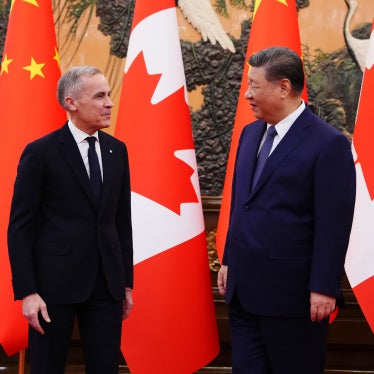The European Union should make normalizing economic relations with Cuba contingent on Cuba’s meaningful progress on human rights, Human Rights Watch said today as EU foreign ministers meet to consider dropping measures imposed in 2003.
Meaningful progress would include the release of all wrongfully imprisoned dissidents. In the April 2003 political crackdown, 75 peaceful dissidents were arrested and sentenced to long prison terms; 61 dissidents remain incarcerated. In the recent release of 14 dissidents, the Cuban government did not acknowledge that they had been wrongly incarcerated, but instead released them for “humanitarian” reasons.
“Cuba’s recent release of some of the dissidents is a welcome step, but it does not signal a meaningful change in the government’s repressive policies,” said José Miguel Vivanco, Americas director at Human Rights Watch. “President Fidel Castro is using human beings as pawns in a political game aimed at improving relations with Europe.”
Another meaningful step for Cuba would be the establishment of legal reforms designed to protect the rights to freedom of expression and association. The Cuban government continues to restrict freedom of expression, association, assembly, movement and the press.
Human Rights Watch does not oppose the European Union’s steps toward greater dialogue with the Cuban government, as long as the European Union uses its contacts with Cuban officials to remind them of the pressing need for human rights reform. In particular, the European Union should continue to take every opportunity to call for the release of all incarcerated dissidents in Cuba and the revision of oppressive laws.
Background
The European Union is rethinking its position on relations with Cuba. In June 2003, after Cuba’s crackdown on dissidents, the EU put relations with Cuba on hold and imposed a set of sanctions that included limiting high-level official visits and inviting Cuban dissidents to National Day receptions in Havana. The Cuban government responded by breaking off all ties to European embassies in Cuba.
With the recent releases of 14 dissidents, however, the European Union— following the lead of the Spanish government— has been considering a re-orientation of its Cuba policy. By mid-January, Cuba had resumed diplomatic contact with all the countries of the European Union.
The EU eliminated a sticking point to improved relations in December 2004 when its Latin America working group recommended that EU countries stop inviting dissidents to National Day receptions.








